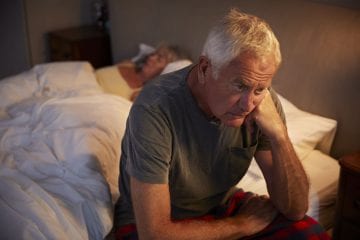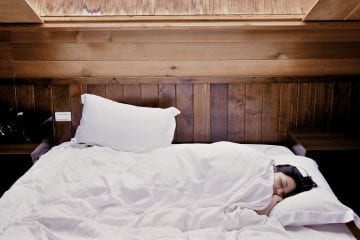We’re all unique, and different things will affect the way we gain and retain weight, but most people will experience weight fluctuations with poor sleep. Individuals who have a solid sleeping pattern find it easier to control their weight. This is an important fact to remember when starting any diet.
Across the Western world obesity rates continue to climb while sleep times have reduced in recent years. Although we shouldn’t get too ahead of ourselves with this connection, it’s still an interesting topic to explore. Is there some cause and effect between the two?
Table of Contents
Weight gain and sleep deprivation
For people who have been sleep deprived the condition may cause poor concentration, irritability, and general lack of energy. It also affects weight gain through four hormones:
- Cortisol - As a stress hormone cortisol is in control of conserving energy and using fat reserves as fuel during the day.
- Insulin - Regulating the process of turning food into energy, insulin is a peptide hormone.
- Ghrelin - Telling the brain when the body needs to eat, ghrelin is often called the ‘hunger hormone’.
- Leptin - Often called the ‘satiety hormone’, leptin’s job is to inform the brain when no more food is necessary.
When the body and mind lack sleep, leptin production decreases while ghrelin production increases. This means that the brain thinks we’re hungry even when we’re full. Higher blood sugar levels follow leading to increased production of cortisol and insulin. Over time the body loses the ability to process sugars and fats as it should because of increased resistance to insulin. Therefore more gets stored as fat and we gain weight.
Lack of self-control
Sadly, people who lack sleep are also more likely to fail new diet plans because they have no self-control. Posted in the Journal of Clinical Nutrition, a study from 2008 showed that high carb snacks and late night eating are more common in people who are sleep deprived.
What’s more, there was a 2013 study in Appetite that showed increased calorie consumption in participants who got less than five hours of sleep. The subjects also consumed more carbs and less water. Some researchers believe the cravings that follow sleep deprivation to be as strong as those experienced after use of marijuana.
When we’re sleep deprived, we’re more likely to:
- crave foods high in fat
- crave lots of carbs
- eat larger portions
- snack late in the evening.
The problem doesn’t end here, because the tiredness that comes with sleep deprivation reduces our energy levels. The last thing we want to do after a night of little sleep is put our trainers on and head to the gym. So all those extra calories we consume aren’t burned.
What does all this mean? When we lack sleep, we’re more likely to gain weight, we don’t exercise, and the negative spiral is hard to escape. Good sleep is ESSENTIAL for maintaining a healthy weight - ideally 7 - 8 hours for the average adult.
Insomnia and weight
Brought on by physical and emotional factors, we perhaps commonly draw links between anxiety/stress and insomnia. As we worry about our weight, there’s a risk of depression which is a co-morbid condition with insomnia (they exist together and contribute to one another). When we’re stressed about anything in life or anxious in some way, it’s much harder to fall asleep.
Insomnia is also a common problem for people with anorexia, bulimia, or another eating disorders. Especially for people who take weight loss drugs or diet pills, the sleep-disrupting ingredients found in such products cause all sorts of sleep related problems; examples of such ingredients are guarana and caffeine.
People who attempt to lose weight by reducing calorie intake are likely to consume more caffeine in order to boost energy levels. Of course, it can result in higher energy even when you’re lying in bed and trying to sleep.
When it comes to insomnia, behaviors, habits, and thought processes play a significant role. Therefore it makes sense that behavioral therapy is one of the more popular insomnia treatment methods. However, when insomnia is caused by a physical problem (such as sleep apnea or obesity), this condition needs to be treated first in order to treat insomnia.
When an emotional condition is to blame, doctors may recommend staying away from late night snacking and highly calorific intake, incorporate relaxation techniques before bedtime, and introduce a strict bedtime schedule. Melatonin is a good sleeping aid for extra help with insomnia.
Does insomnia ever have the opposite effect? Yes, some people with insomnia may lose weight, but this is normally a result of increased physical activity during the day; at some point the extent of physical activity will counter the impact of sleep deprivation.
Sleeping late
Some people sleep late and get up late. It’s important to note that this doesn’t necessarily mean that one is sleep deprived. According to Northwestern Medicine researchers late sleepers tend to have a poorer diet. They consume more calories later in the day and are more likely to drink soda, eat fast food, and avoid fruit and vegetables.
Some experts predict that this lifestyle can add up to two pounds of weight gain per month for late sleepers who have such diet and don’t exercise. Plus, overeating at night energizes the body, which can lead to insomnia.
In the same study the researchers wanted to differentiate between calorie consumption and the time of day when the calories were consumed. Since the circadian rhythms play an important role in regulating core body temperature, metabolism, organ function, production of hormones, and the sleep-wake cycle, the timing of meals is pivotal.
The metabolic syndrome
Disrupted sleep is a problem because it affects the glucose levels which increases the risk of the metabolic syndrome. Today the metabolic syndrome is worryingly normal in middle-aged Americans.
To be diagnosed with the metabolic syndrome a person needs to show at least two of the following symptoms:
- Hypertension
- Resistance to insulin
- Obesity
- Dyslipidemia.
We lead busy lifestyles and it’s easy to accrue a sleep debt with the idea of catching up at the weekend. Although this seems to make sense, it doesn’t exactly work this way and experts say that missing out on even 30 minutes of sleep per day can increase resistance to insulin. If we continue this pattern, it leads to metabolic issues, obesity, and type 2 diabetes (as was found in the 2015 study).
If this information hasn’t spurred you into action, allow us to go over two facts/statistics:
- The risk of the metabolic syndrome is high in long sleepers just as much as in short sleepers.
- The metabolic syndrome is TWICE as common in people who sleep between 6-7 hours as in those who sleep 7-8 hours.
Some years ago there was a study published in the scientific journal Sleep which found the metabolic syndrome to be linked to signs such as difficulty falling asleep and loud snoring. The study suggested that sleep problems predicted the onset of the syndrome. Why? Because loud snoring leads to fragmentation of sleep. That leads to an increase in weight, more stress, and a response in the immune system.
Whenever our sleep is disturbed in some way, oxidative stress increases and this has the potential to cause weight gain. When we gain weight, there’s always the risk of sleep apnea too. This places further stress on the body and breaks up sleep even more.
Using your diet to improve sleep
Many studies that suggest that sleep is helped by losing weight. In one study the following decreases were seen after weight loss surgery in obese participants:
- Daytime fatigue - 39% to 4%
- Snoring - 82% to 14%
- Poor sleep - 39% to 2%
- Sleep apnea - 33% to 2%.
As mentioned, sleeping too long can be just as dangerous as not sleeping enough. Just like sleeping fewer than 6 hours, weight gain is common in people who sleep more than 9 hours. If you really want to lose weight, we recommend sleeping between 7 and 8 hours.
Oversleeping
In addition to weight gain, researchers have found the following risks to increase in people who oversleep:
- Inflammation in the body
- Memory problems
- Bodily pain
- Anxiety and depression
- Mortality (all causes)
- Heart disease and stroke.
Unfortunately sleeping between 12 and 20 hours a day to avoid eating brings a plethora of health concerns both in the short and long term. With such excessive sleep the body doesn’t get the calories (fuel) it needs to operate, and every organ from the lungs through the heart and bones to the muscles will deteriorate.
Oversleeping will affect the biorhythms (bio clock). We’ve seen how this biological clock controls cognitive function, immune system, metabolism, and most other functions, so it’s important to keep this mechanism on track.
These systems are regulated effectively, and you even keep control of your libido and appetite when you sleep 7 - 8 hours. With a healthy sleep pattern one can enjoy a balanced lifestyle now and long into the future.
Dealing with sleep apnea
As a breathing disorder sleep apnea affects an estimated 18 million Americans every single year. While lighter cases lead to heavy snoring, more serious cases of obstructive sleep apnea cause individuals to gasp for breath at night. Whether mild or serious, the issue is commonly connected to heart attacks, stroke, obesity, and daytime fatigue.
Whenever we carry extra weight, we’re putting ourselves at risk of sleep apnea because of the added pressure on our airways. With so many overweight individuals affected there tends to be less of an inclination to eat healthily and exercise regularly. Especially when the sleep apnea prevents quality sleep, it may lead to fatigue during the day and even less motivation to exercise or cook hearty meals. Instead the sufferers are stuck in a negative spiral of poor sleep, low energy during the day, lack of control, bad mood, and even frustrated partners.
After visiting a doctor they might receive a CPAP machine which can reduce the symptoms and lead to nights of peaceful sleep. When sleep improves, all the symptoms we mentioned are lifted and it becomes easier to adjust the diet and exercise regime.
As well as potential equipment to assist breathing while sleeping, doctors may suggest lifestyle changes. Most importantly, they’ll offer advise weight loss. There are many studies that show a reduction in obstructive sleep apnea symptoms after weight loss.
Dieting: paleo and low carb
Although you’re making an effort to become healthier, insomnia is possible when starting a low-carb or paleo diet. Don’t worry, your body will soon adjust to consuming fewer calories and the symptoms of insomnia should go away.
However, if you’ve started a new diet and insomnia continues for weeks, you may need more carbs in your diet to aid sleep. Since foods rich in carbs help production of serotonin and tryptophan which induce sleep, they’re a necessity for the release of melatonin and to reduce anxiety.
Elsewhere we also need insulin to convert tryptophan into serotonin; carbs will aid the production of insulin more than any other food group. Low-carb diets will certainly help with blood sugar levels and weight loss in the long term. However, they can also shock our bodies in the early days. The body will suddenly have to work hard to convert the tryptophan to serotonin disrupting our sleeping pattern in the process.
The best thing for people accustomed to eating lots of carbs and sugary foods is to ease into a low-carb diet. Gradually reduce them over several weeks. Don’t instantly starve your body, give it time to adjust and increase the chances of sticking with this healthy change.
If your chosen diet still allows a certain amount of carbs, we recommend consuming them later in the day because this will help you get to sleep more easily.
Final tips
Before we let you get on with your day, we want to talk about late night toilet trips. Aren’t they frustrating while you’re trying to sleep? Well, they’re common for people who drink lots of water or move across to a liquid diet. Be careful with how much water you drink throughout the day.
However, if you tend to get hungry before bedtime, there’s nothing wrong with a small healthy snack because being hungry will likely keep you awake.
Finally, we’ve said it before, but we cannot understate the effect of caffeine and alcohol after a certain point in the day. Don’t overstimulate your body because it can make it harder to get to sleep at night.



